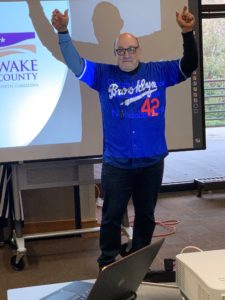“George, you throw like a girl!” rang in my ears as my Little League coach told me to throw like “a boy.”
Unfortunately, for many of us, that was our only exposure to coaches, the loud ones, ready to discipline and highlight your mistakes.
Decades later, I still don’t know what he meant. He never explained to me how to pitch a ball in a way that made sense. I also didn’t givehim a chance to coach me further.
His shouting, his aggressive commands and the chaos at practice was too much for me to stay in the team. I quit Little League and was done with sports for the rest of my life. Don’t ask me whether the Lambs or Demons won the latest basketball championship, or which animal team won big at the Super Bowl. I don’t have a clue.

Fortunately, some of you have fond memories of sports. You had enthusiastic coaches who encouraged and instilled sportsmanship in you.
That was my brother’s case. He thrived in the structured and demanding world of sports. Being pushed and challenged was fun for him. He thrived in competitive settings.
Although I didn’t stick to sports, I did establish myself in the business coaching field.
What is a business coach?
A business coach guides business folks into being the best they can be whether they are CEOs, business owners, executives, managers or employees. The team is the whole company and the players are the employees.
At Raleigh Consulting Group, our clients are all the above…and sometimes, their family members, too.
The key to our coaching engagement is that the client must be willing and personally committed to be coached. Remember my quitting Little League? I didn’t want it.
There was no one who could have forced me to continue. And no one can force you to seek a coach, either.
To introduce clients to what coaching is, I first tell them what coaching isn’t:
- It is not a performance evaluation before you get put in probation.
- It is not a session to gossip, vent, and trash-talk your organization or coworkers, although that happens sometimes, I always bring it back to how are YOU going to manage this situation or person?
- It isn’t a time to be chastised or be yelled at on behalf of a superior.
This is a typical business coaching session:
A coach gets agreement on the objectives of the coaching engagement. Sometimes, bosses and/or direct reports might be initially included. He/she actively listens and reflects what the client is saying. Aha moments come faster when there’s two minds problem solving.
At Raleigh Consulting Group, we always make sure that what-ever we discuss, personal and professional, will remain confidential. Imagine having someone with whom you get non-judgmental help with on your big decisions; taking a promotion or leaving the company, as an example.
A coach offers self-understanding and helps bring out the best in people:
Most people have a good sense of who they are but in new situations, around new people, or in stress, we don’t act as well as when things are predictable, we don’t perform as powerfully as with those we already know. We use assessment tools to quickly and efficiently offer a well of insight into your working style. From there, we create a plan for your future performance. Together, we identify what is missing, how to find resources and how to allocate time or money to obtain those tools that will help us work smarter. Of course, we build on your strengths.
A coach offers ideas and resources not always solutions:
Often, people think that coaches have all the solutions and that they should offer them right away. That is not the case with our style of coaching. (There are coaches who are Subject Matter Experts). We don’t know all the solutions for all the industries in the world. We offer a view of the bigger picture. Sometimes, as business owners, we’re too busy working in our business and forget to work on the business. My 39 years of experience has helped me gain knowledge and wisdom and that has made it easier to identify patterns and offer guidance.
A coach guides through encouragement:
This is a quality shared among the best coaches. Sometimes our clients are too self-critical. Their own expectations are too rigid. Sometimes, they feel like they must please everyone and solve everyone’s problems. At times, their own sense of self is low, and they compensate by becoming work-acholic. In such instances, we amplify the great qualities their team recognizes in them. We work on building their inner strength and rescilience. We sometimes are that buffer of support for when they are confronted with resistance to change. At such times, we are both their coach and cheerleader.
A coach helps you be accountable:
Who will help you track your goals and set expectations? We don’t like spending time with clients who huff and puff about their ego and how good they are. Everyone needs someone who will help them stick to their stated goals and the changes they promised to make. Many clients come stressed when they’ve had it with a VP who constantly goes behind their backs and leads teams in a different direction than agreed upon, or when two business partners can no longer hear each other due to shouting and cancelled meetings. We are there to remind them that our coaching sessions should stay in the calendar because sometimes neglect leads to recurrence of inter-personal conflict or self-sabotage.
We help people work more confidently and play better with others. Our clients have said that their positive behavioral changes are noticed at home, too. Personally, that gives me great joy, to know that we could all work, play and live better together.
Who is the best candidate for coaching? It’s not the person who is under stress or who’s team or company is not getting along. It is not just the ones who need coaching. It’s the ones who want it. Maybe I would enjoy sports now if I had found the right coach who’d encouraged and brought out the best in me.
Take care,
George Alwon

